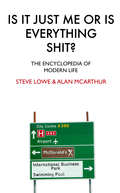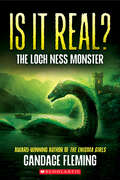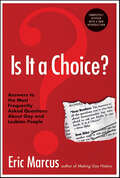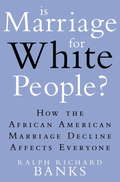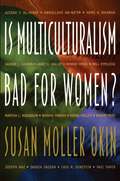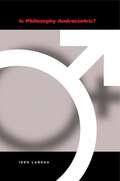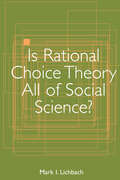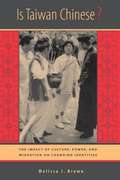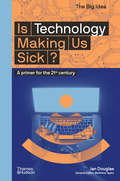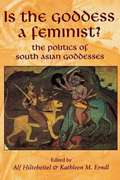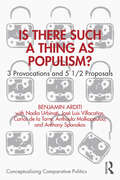- Table View
- List View
Is It Just Me Or Is Everything Shit? - Volume Two
by Steve Lowe Alan McArthurBigger, badder, sharper, ruder, funnier, bestier . . . this all-new companion volume to the 2005 Christmas bestseller IS IT JUST ME OR IS EVERYTHING SHIT? perfectly complements the first book to form the standard reference work on the shittiness of modern life - like a part-work, only good. Entries include: David Cameron, Lemsip, Baby Asbos, Dream homes, the Chinese Communist Party, Chefs' families, Zac Goldsmith, the Olympics, Credit cards marketed as sources of spiritual enlightenment, Nu-Torture, Cornish nationalism, Detox socks, Stag weeks and Politicians called David. Because, if anything, it just keeps getting worse . . .
Is It Just Me Or Is Everything Shit? - Volume Two
by Steve Lowe Alan McArthurBigger, badder, sharper, ruder, funnier, bestier . . . this all-new companion volume to the 2005 Christmas bestseller IS IT JUST ME OR IS EVERYTHING SHIT? perfectly complements the first book to form the standard reference work on the shittiness of modern life - like a part-work, only good. Entries include: David Cameron, Lemsip, Baby Asbos, Dream homes, the Chinese Communist Party, Chefs' families, Zac Goldsmith, the Olympics, Credit cards marketed as sources of spiritual enlightenment, Nu-Torture, Cornish nationalism, Detox socks, Stag weeks and Politicians called David. Because, if anything, it just keeps getting worse . . .
Is It Just Me Or Is Everything Shit?: The Encyclopedia of Modern Life
by Steve Lowe Alan McArthurIf you hate: loft living; bar-clubs; Tony Blair; chick lit; global warming sceptics; Keane; loyalty cards; IKEA; Kabbalah; bling and Richard Curtis...... then you need IS IT JUST ME OR IS EVERYTHING SHIT? - an encylopedic attack on modern culture and the standard reference work for everyone who believes everything is shit. Which it is. This book is for the large percentage of the population interested in saying NO to the phoney ideas, cretinous people, useless products and doublespeak that increasingly dominate our lives. This book is designed for everyone who thinks they may have mislaid their soul in a Coffee Republic. Never before has there been a book so completely full of shit.This very funny, well-informed, belligerent rant of a book adds up to an excoriating broadside against consumer capitalism that the authors hope will sell loads of copies.
Is It Just Me Or Is Everything Shit?: The Encyclopedia of Modern Life
by Steve Lowe Alan McArthurIf you hate: loft living; bar-clubs; Tony Blair; chick lit; global warming sceptics; Keane; loyalty cards; IKEA; Kabbalah; bling and Richard Curtis...... then you need IS IT JUST ME OR IS EVERYTHING SHIT? - an encylopedic attack on modern culture and the standard reference work for everyone who believes everything is shit. Which it is. This book is for the large percentage of the population interested in saying NO to the phoney ideas, cretinous people, useless products and doublespeak that increasingly dominate our lives. This book is designed for everyone who thinks they may have mislaid their soul in a Coffee Republic. Never before has there been a book so completely full of shit.This very funny, well-informed, belligerent rant of a book adds up to an excoriating broadside against consumer capitalism that the authors hope will sell loads of copies.
Is It Just Me Or Is Everything Shit?: The Encyclopedia of Modern Life
by Steve Lowe Alan McArthurIf you hate: loft living; bar-clubs; Tony Blair; chick lit; global warming sceptics; Keane; loyalty cards; IKEA; Kabbalah; bling and Richard Curtis... ... then you need IS IT JUST ME OR IS EVERYTHING SHIT? - an encylopedic attack on modern culture and the standard reference work for everyone who believes everything is shit. Which it is. This book is for the large percentage of the population interested in saying NO to the phoney ideas, cretinous people, useless products and doublespeak that increasingly dominate our lives. This book is designed for everyone who thinks they may have mislaid their soul in a Coffee Republic. Never before has there been a book so completely full of shit.This very funny, well-informed, belligerent rant of a book adds up to an excoriating broadside against consumer capitalism that the authors hope will sell loads of copies.
Is It Racist? Is It Sexist?: Why Red and Blue White People Disagree, and How to Decide in the Gray Areas
by Jessi Streib Betsy Leondar-WrightHow can the judgment calls we make in everyday life create or help eradicate social inequality? Is It Racist? Is It Sexist? Two questions that seem simple on their face, but which invite a host of tangled responses. In this book, Jessi Streib and Betsy Leondar-Wright offer a new way of understanding how inequalities persist by focusing on the individual judgment calls that lead us to decide what's racist, what's sexist, and what's not. Racism and sexism often seem like optical illusions—with some people sure they see them and others sure they're not there—but the lines that most consistently divide our decisions might surprise you. Indeed, white people's views of what's racist and sexist are increasingly up for grabs. As the largest racial group in the country and the group that occupies the most and the highest positions of power, what they decide is racist and sexist helps determine the contours of inequality. By asking white people—Southerners and Northerners, Republicans and Democrats, working-class and professional-middle-class, men and women—to decide whether specific interactions and institutions are racist, sexist, or not, Streib and Leondar-Wright take us on a journey through the decision-making processes of white people in America. By presenting them with a variety of scenarios, the authors are able to distinguish the responses as being characteristic of different patterns of reasoning. They produce a framework for understanding these patterns that invites us all to engage with each other in a new way, even on topics that might divide us. Is It Racist? Is It Sexist? will leave you questioning how you decide whether a joke, a hiring decision, or a policy change is or isn't racist or sexist, and will give you new tools for making more accurate and productive judgment calls.
Is It Real? The Loch Ness Monster
by Candace FlemingPut on your detective hat and prepare all your investigative tools, because you've been assigned a new case to solve: the mystery of the Loch Ness Monster!Follow along as award-winning author Candace Fleming uses all of her nonfiction tools and storytelling prowess to investigate the enduring mystery surrounding the existence of the Loch Ness Monster.Nestled in the lush green hills of the Scotland Highlands lies Loch Ness, a deep, murky lake with a storied history. It is also the home of the Loch Ness Monster. Numerous stories and photographs by people claiming to have spotted the mysterious monster have surfaced, often gaining immediate fame. But after decades of countless expeditions, documentaries, firsthand accounts, pictures, and videos, the mystery of Nessie continues to haunt us.Now, Sibert Award-winning author Candace Fleming invites you to become a detective and to join the race to uncover the truth. You'll learn how real-life detectives and scientists conduct their investigations to solve the greatest mysteries as the principles of the Scientific Method and more tools for boosting critical thinking and analysis are introduced. You will consider the evidence, see if you can tell the difference between fact and fiction, and maybe you can answer this age-old question about the Loch Ness monster: Is it real?
Is It Tomorrow Yet?: Paradoxes of the Pandemic
by Ivan KrastevA FINANCIAL TIMES BOOK OF THE YEAROne of our most scintillating public intellectuals explores the political paradoxes of the pandemic and helps us think our way through it'We are able to imagine anything because we are being besieged by something that was considered unimaginable...'Beneath the panic and bluster, beneath the confusing speeches and the conflicting advice, the Coronavirus pandemic acted, changing our world in the most profound ways. The tragic human cost and the economic devastation will be assessed and calculated for decades to come. But the pandemic also changed things in ways that are less easily expressed and understood. It has made bare the frayed contradictions of modern life. It has distorted things that seemed simple and settled. It has affirmed plain, uncomfortable truths. In this brilliant, thought-provoking essay, Ivan Krastev, one of our most interesting thinkers today, explores the pandemic's immediate consequences and conceives of its long-term legacy. Will things be different for the communities most harmed, and for those who escaped the worst? Where are we now with the US and China, with the UK and Europe? And how do we think our way through the unthinkable?
Is It a Choice?: Answers to Three Hundred of the Most Frequently Asked Questions About Gay and Lesbian People
by Eric MarcusThe answers to all the questions you've ever had about sexual orientation but were afraid to ask. Eric Marcus provides insightful, no-nonsense answers to hundreds of the most commonly asked questions about same-sex orientation. Offering frank and accepting insight on everything you've always wanted-and needed-to know about same-gender relationships, coming out, family roles, politics, and much more, including: How do you know if you're gay or lesbian?What should you do if your child is gay or lesbian?Do gay parents raise gay children?What does the Bible say about homosexuality?
Is Marriage for White People?
by Banks Ralph RichardA distinguished Stanford law professor examines the steep decline in marriage rates among the African-American middle class, and offers a paradoxical--nearly incendiary--solution.
Is Masculinity Toxic?: A Primer For The 21st Century (The Big Idea Series #0)
by Andrew SmilerThis timely title weighs masculinity’s capacity for good against its potential for destruction in the context of contemporary debates on the topic. In the wake of the MeToo movement and the upsurge in both feminist and men’s rights activism, traditional masculinity has become the topic of impassioned debate. Is Masculinity Toxic? interrogates the myths surrounding modern manhood, asking whether—and how—we need to change our attitudes toward masculinity in the twenty-first century. Therapist Andrew Smiler addresses the topic of masculinity in four chapters: “Evolving Understandings of Masculinity,” which examines the history of ideas about masculinity, “Male Power to Harm,” which dissects the societal impacts of “toxic” masculinity, including bullying behavior, rape culture, and early male mortality; “Men and Interpersonal Relationships,” discusses how men are encouraged not to express their feelings, the sexual objectification of women, and male attitudes toward fatherhood; and “Changing Face of Masculinity Today,” which details the ways in which masculinity might adapt to the last century’s sweeping changes in gender roles. Is Masculinity Toxic? revisits all sides of the debate, recognizing the positive impact of some of today’s models of masculinity while acknowledging the failures and limitations of others.
Is Multiculturalism Bad for Women?
by Susan Moller OkinPolygamy, forced marriage, female genital mutilation, punishing women for being raped, differential access for men and women to health care and education, unequal rights of ownership, assembly, and political participation, unequal vulnerability to violence. These practices and conditions are standard in some parts of the world. Do demands for multiculturalism--and certain minority group rights in particular--make them more likely to continue and to spread to liberal democracies? Are there fundamental conflicts between our commitment to gender equity and our increasing desire to respect the customs of minority cultures or religions? In this book, the eminent feminist Susan Moller Okin and fifteen of the world's leading thinkers about feminism and multiculturalism explore these unsettling questions in a provocative, passionate, and illuminating debate. Okin opens by arguing that some group rights can, in fact, endanger women. She points, for example, to the French government's giving thousands of male immigrants special permission to bring multiple wives into the country, despite French laws against polygamy and the wives' own bitter opposition to the practice. Okin argues that if we agree that women should not be disadvantaged because of their sex, we should not accept group rights that permit oppressive practices on the grounds that they are fundamental to minority cultures whose existence may otherwise be threatened. In reply, some respondents reject Okin's position outright, contending that her views are rooted in a moral universalism that is blind to cultural difference. Others quarrel with Okin's focus on gender, or argue that we should be careful about which group rights we permit, but not reject the category of group rights altogether. Okin concludes with a rebuttal, clarifying, adjusting, and extending her original position. These incisive and accessible essays--expanded from their original publication in Boston Review and including four new contributions--are indispensable reading for anyone interested in one of the most contentious social and political issues today. The diverse contributors, in addition to Okin, are Azizah al-Hibri, Abdullahi An-Na'im, Homi Bhabha, Sander Gilman, Janet Halley, Bonnie Honig, Will Kymlicka, Martha Nussbaum, Bhikhu Parekh, Katha Pollitt, Robert Post, Joseph Raz, Saskia Sassen, Cass Sunstein, and Yael Tamir.
Is My Child Overtired?
by Will WilkoffWake up! Your kids are tired. More and more often, bedtime is a battle that parents just don't have the energy to fight. With the demands of juggling work, running a household, and raising kids, it is easy for parents to be lax about their children's sleep habits. They may not realize that fatigue is the number-one cause of health and behavioral problems, and it is frequently overlooked. If you find that your kids are often cranky, hyperactive, or prone to headaches and growing pains, these are red flags that they may be overtired. Describing the unique sleep requirements for every stage of a child's development from infancy through adolescence, Is My Child Overtired? is a proactive child-rearing plan that encourages parents to establish and stick to a sleep routine for the whole family. Pediatrician Will Wilkoff, M.D., explains how to recognize the signs of fatigue and gives you specific guidelines to determine how much sleep a child really needs (you'll be surprised -- they need a lot more than you think). Combining practical wisdom with a voice you can trust, Is My Child Overtired? discusses: Getting off on the right foot with your new baby Helping your child to sleep through the night Crafting a relaxing and reliable bedtime ritual Adding daytime siestas when nighttime sleep isn't enough Finding ways to maintain bedtimes on weekdays, on weekends, and even during school vacations and family trips Simply put, when your kids sleep more, they'll feel better. And so will you.
Is Philosophy Androcentric?
by Iddo LandauIn Is Philosophy Androcentric?, Iddo Landau contends that none of the arguments for viewing philosophy as pervasively androcentric ultimately stand up to rational scrutiny, while the ones that show it to be nonpervasively androcentric do not undermine it in the way that many critics have supposed. “Philosophy emerges, in almost all of its parts,” he concludes, “as human rather than male, and most parts and aspects of it need not be rejected or rewritten."
Is Rape a Crime?: A Memoir, an Investigation, and a Manifesto
by Michelle BowdlerLonglisted for the 2020 National Book Award for NonfictionTIME's 100 Must-Read Books of 2020Publishers Weekly, Best Books of 2020New York Times New & Noteworthy AudiobooksLit Hubs Most Anticipated Books of 2020Starred Review Publishers WeeklyStarred Review Shelf Awareness"Is Rape a Crime? is beautifully written and compellingly told. In 2020, we were all looking for solutions and this book was right on time. It is one we should all be reading." —Anita Hill"This standout memoir marks a crucial moment in the discussion of what constitutes a violent crime."—Publishers Weekly, Best Books of 2020 She Said meets Know My Name in Michelle Bowdler's provocative debut, telling the story of her rape and recovery while interrogating why one of society's most serious crimes goes largely uninvestigated.The crime of rape sizzles like a lightning strike. It pounces, flattens, destroys. A person stands whole, and in a moment of unexpected violence, that life, that body is gone.Award-winning writer and public health executive Michelle Bowdler's memoir indicts how sexual violence has been addressed for decades in our society, asking whether rape is a crime given that it is the least reported major felony, least successfully prosecuted, and fewer than 3% of reported rapes result in conviction. Cases are closed before they are investigated and DNA evidence sits for years untested and disregardedRape in this country is not treated as a crime of brutal violence but as a parlor game of he said / she said. It might be laughable if it didn’t work so much of the time. Given all this, it seems fair to ask whether rape is actually a crime.In 1984, the Boston Sexual Assault Unit was formed as a result of a series of break-ins and rapes that terrorized the city, of which Michelle’s own horrific rape was the last. Twenty years later, after a career of working with victims like herself, Michelle decides to find out what happened to her case and why she never heard from the police again after one brief interview. Is Rape a Crime? is an expert blend of memoir and cultural investigation, and Michelle's story is a rallying cry to reclaim our power and right our world.
Is Rational Choice Theory All of Social Science?
by Mark I. LichbachAdvocates of rational choice theory in political science have been perceived by their critics as attempting to establish an intellectual hegemony in contemporary social science, to the detriment of alternative methods of research. The debate has gained a nonacademic audience, hitting the pages of the New York Times and the New Republic. In the academy, the antagonists have expressed their views in books, journal articles, and at professional conferences. Mark I. Lichbach addresses the question of the place of rational choice theory in the social sciences in general and in political science in particular. He presents a typology of the antagonists as either rationalist, culturalist, or structuralist and offers an insightful examination of the debate. He reveals that the rationalist bid for hegemony and synthesis is rooted in the weaknesses, not the strengths, of rationalist thought. He concludes that the various theoretical camps are unlikely to accept the claimed superiority of the rationalist approach but that this opposition is of value in itself to the social sciences, which requires multiple perspectives to remain healthy. With its penetrating examination of the assumptions and basic arguments of each of the sides to this debate, this book cuts through the partisan rhetoric and provides an essential roadmap for the future of the discipline. Mark I. Lichbach is Professor of Government and Politics, University of Maryland.
Is Science Multicultural? Postcolonialisms, Feminisms, and Epistemologies
by Sandra HardingThis book explores what the last three decades of European/American, feminist, and postcolonial science and technology studies can learn from each other. Sandra introduces and discusses an array of postcolonial science studies.
Is Science Racist? (Debating Race)
by Jonathan MarksEvery arena of science has its own flash-point issues—chemistry and poison gas, physics and the atom bomb—and genetics has had a troubled history with race. As Jonathan Marks reveals, this dangerous relationship rumbles on to this day, still leaving plenty of leeway for a belief in the basic natural inequality of races.The eugenic science of the early twentieth century and the commodified genomic science of today are unified by the mistaken belief that human races are naturalistic categories. Yet their boundaries are founded neither in biology nor in genetics and, not being a formal scientific concept, race is largely not accessible to the scientist. As Marks argues, race can only be grasped through the humanities: historically, experientially, politically. This wise, witty essay explores the persistence and legacy of scientific racism, which misappropriates the authority of science and undermines it by converting it into a social weapon.
Is Social Justice Just?
by Christopher J. Coyne&“Anyone concerned with social justice will find this book makes him question his assumptions, rethink his premises, and think!&” —Andrew P. Morriss, professor, Bush School of Government and Public Service, School of Law, Texas A&M UniversityWhat is social justice? In these pages, twenty-one accomplished academics seek to do justice to &“social justice.&” Inequality exists and obviously causes rifts in societies. But it&’s not obvious how the government should address those rifts, or if it should address them at all. Have we forgotten the perhaps more efficient power of personal choice—and the corollary obligation: to serve our neighbors—to make our society more humane? Beginning with the first political philosophers in ancient Athens, and continuing right through Marx into our post-modern era, men have wrestled with the question of justice; and the answers have been as earnest as they have been varied. Today, our &“expert&” class also claim to have answers—updated answers, more &“equitable&” answers, more technological answers ... in short, answers that are simply better suited to our times. But are those answers in any way correct? Do they work? Are they—just? In these elegant, nuanced essays, the authors use the wisdom of ancient and modern philosophers to shed light on these important questions—and the answers are revealing. Armed with ample evidence from real-world experiences, lessons from history, the wisdom of the classics, modern philosophers, and even the teachings of the world religions, the contributors of Is Social Justice Just? illuminate the central role of the individual in achieving justice in all its aspects. Read Is Social Justice Just? and discover: how to do social justice wrong with the poison of resentment, envy, and ignorance; how to do social justice right with the insights of philosophers and theologians; how to respect people&’s rights and liberties without sacrificing true equality; and how to reform flawed public policies that just make everything worse. In a world of partisanship, hysteria, maliciousness, and good intentions attached to hellish outcomes, this landmark book enters the public discourse at a critical time. With a foreword by Jordan B. Peterson, a preface by Nicholas Rescher, and a collection of essays by some of the best and brightest scholars of our time, Is Social Justice Just? is a timely and urgent work. Read it, and you will begin to think about &“social justice,&” and justice, in some surprising new ways.
Is Taiwan Chinese? The Impact of Culture, Power, and Migration on Changing Identities
by Melissa J. BrownIn a unique comparison of ethnographic and historical case studies drawn from both Taiwan and China, Brown's book shows how identity is shaped by social experience--not culture and ancestry, as is commonly claimed in political rhetoric.
Is Technology Making Us Sick?: A Primer For The 21st Century (The Big Idea Series #0)
by Ian DouglasThis new volume in The Big Idea series evaluates the impact of the increased use of technology in everyday life on society. Modern technology has undoubtedly enhanced our lives in numerous, powerful ways—we can now communicate in real time with friends and colleagues around the world, and do mundane tasks such as shopping or banking at a touch. But has there been a detrimental effect on our health and happiness? Is Technology Making Us Sick? assesses the impact of our increased screen time and everyday interactions with modern technology, the ways we relate to others, and on our mental and physical health. In Is Technology Making Us Sick?, expert Ian Douglas traces the development of human interaction with technology over the last thirty years. His in-depth analysis dissects the key issues, including the consequences of social media and gaming on self-esteem, brain development, anxiety levels, loneliness, depression, and personal relationships; and the impact on our stress levels of always being plugged into the internet. Ultimately, Is Technology Making Us Sick? offers strategies to combat habit-forming products and presents ways to take advantage of revolutionary technology without falling victim to its negative impacts.
Is That My Child?
by Dr Robin PaucAt least one child in five experiences some form of learning difficulty, but:* Learning difficulties as we understand them DO NOT exist* They are not diseases just symptoms* These symptoms never appear alone* They are treatable and avoidableDr Robin Pauc, an expert in child neurology, approaches learning difficulties, including Dyslexia, ADD, OCD, ADHD, Dyspraxia and Tourette's syndrome of childhood, from a truly ground-breaking perspective. All human babies are born prematurely and develop special new brain cells four months after birth. Every human's developement in the womb and particularly in these early stages of life can, therefore, be affected by devlepement delay, which can blight childhood and marginalize a child at school. Since our brains continue to grow, however, the symptoms can also be treated.Is That My Child? Explains the backround to human developmental delay and contains:* Advice on how to get the best assessment for your child and an explanation of what the examination must include* The effects - good and bad - of certain foods on the brain* Excercises and computer programs that you can use to expand your child's neural function* Case histories of children on whom this plan has workedIn the single biggest breakthorough in the history of learning difficulties, Is That My Child? explains the cause of Development Delay Syndromes, uses simple, easy-to-follow tips to show you how to greatly reduce the risk of your child suffering, and gives advice on what can be done to treat those children that do.
Is That True?: Critical Thinking for Sociologists
by Joel BestAcross disciplines, critical thinking is praised, taught, and put into practice. But what does it actually mean to think critically? In this brief volume, sociologist Joel Best examines how to evaluate arguments and the evidence used to support them as he hones in on how to think in the field of sociology and beyond. With inimitable style that melds ethnographic verve with dry humor, Best examines the ways in which sociologists engage in fuzzy thinking through bias, faddish cultural waves, spurious reasoning, and implicit bias. The short chapters cover: A general introduction to critical thinking and logic in the social sciencesSociology as an enterpriseKey issues in thinking critically about sociological researchChallenging questions that confront sociologists and a call for the discipline to meet those challenges. Students across disciplines will learn the building blocks of critical thinking in a sociological context and come away with key concepts to put into practice.
Is The Goddess a Feminist? The Politics of South Asian Goddesses
by Alf Hiltebeitel Kathleen M. ErndlIn India, God can be female. The goddesses of Hinduism and Buddhism represent the largest extant collection of living goddesses anywhere on the planet. Feminists in the West often draw upon South Asian goddesses as theological resources in the contemporary rediscovery of the Goddess. Yet, these goddesses are products of a male supremacist society. What is the impact of powerful female deities--their images, projections, textuality, and history--on the social standing and psychological health of women? Do they empower women, or serve the interests of patriarchal culture? Is the Goddess a Feminist? looks at the goddesses of South Asia to address these questions directly. Not a book about a single goddess or even about a variety of South Asian goddesses, the volume raises questions about images of deities as symbols and the ways in which they function. Contributors discuss contemporary Indian women who have embraced goddesses as spiritually and socially liberating, as well as the seeming contradictions between the power of Indian goddesses and the lives of Indian women. They also explore such topics as the element of male desire in the embodiment of female deities, the question of who speaks for the goddesses, and the politics and theology of Western feminist use of Hindu and Buddhist goddesses as models for their feminist reflections.
Is There Such a Thing as Populism?: 3 Provocations and 5 1/2 Proposals (Conceptualising Comparative Politics)
by Benjamin ArditiIs There Such a Thing as Populism? calls into question our common understanding of populism. Taken on their own, commonplace references to the people, leaders, or elites are more like dog whistles or false positives of populism than part of a serious attempt to address the phenomenon. Scholars asked themselves, “What is populism?” without realizing that this assumed there was such a thing and that we just needed to figure out what it meant. That was a mistake. Benjamin Arditi proposes that we put this certainty on hold and start from a different premise, asking, “Is there such a thing as populism?” This doesn’t rule out its existence or take it for granted.Structured as a set of polemical interventions and theoretical proposals, Arditi addresses key theoretical, methodological, and comparative questions in the study of populism. These include the limitations of formal definitions of populism, the importance of context and the conjuncture, polemics, the situated gaze, and issues concerning strategic relations and governing from below. Five subject experts, Nadia Urbinati, José Luis Villacañas, Carlos de la Torre, Anthoula Malkopoulou, and Anthony Spanakos, react to Arditi’s theses in captivating conversations on how to study populism and the way in which populism has been used in contemporary comparative analysis. Refreshingly different and thought-provoking, Is There Such a Thing as Populism? is the ideal departure for the exploration of this diverse and fascinating political movement.

